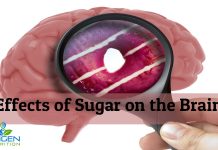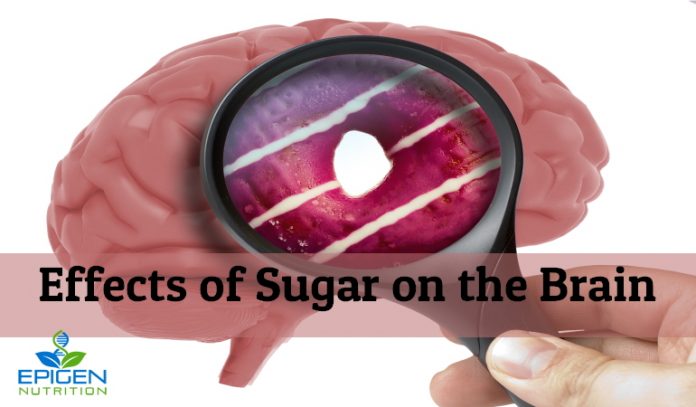A lot of us pile it on our cereals, spoon it into our drinks or use it to sweeten different food dishes, but do we actually understand what the effects of sugar on the brain really are?
When we eat or drink a sugar loaded product, our taste buds and brain instantly recognize the sweetness.
For most of us, a sugary treat tastes great! However, if we do allow ourselves to eat sugary-laden foods all the time, our health will suffer, including our brain health.
The moment our taste buds identify the sweetness in any food, the brain is signaled.
The reward pathways in the brain light up, triggering the release of dopamine (your happy hormones), which is why we feel good when eating something sweet.
The problem is, if we maintain a high consumption of sugary foods, our brain’s reward system will be chronically activated.
This puts us at risk of craving these types of foods every day, or as often as possible. More commonly known as a ‘sugar hit’ craving.
This is when we start to lose control and our body develops an increased intolerance towards the amount of sugar that we can consume.
If left unabated, we can develop a sugar addiction and will therefore, undoubtedly, give in to all of our cravings.
The Sugar Effect on Our Brain’s Neurotransmitters
Eating too many sugary foods leads us to experience side effects of sugar, and what is commonly referred to as a ‘sugar crash’.
Soon after eating it, whereby you may initially feel a rush of energy, the crash occurs.
This crash is a direct result of blood sugar levels plummeting, which is due to a panic release of insulin, as our body tries to protect itself from the influx of sugar.
This sugar crash can manifest in the form of brain fog, irritability, fatigue and a change in mood.
Once our body’s glucose levels dip, we are likely to feel moody, depressed and anxious. Not uncommonly, we may also feel suddenly very tired and want to lay down.
Part of the reason why this negative reaction occurs is because the sugar adversely affects our brain’s neurotransmitters.
Not only does the sugar release dopamine, the excessive sugar consumption leads another hormone, serotonin, to be excessively produced as well.
Once this hormone becomes depleted, our happy mood is depleted too.
Those sugary treats can have us twirling around in a vicious cycle, whereby we simply crave sugar again to boost our moods once more.
Sugar Can Increase the Risk of Cognitive Decline

Studies show that excessive sugar consumption slows down the brain which then affects memory and learning.
Regular, excessive sugar consumption can then lead to the development of insulin resistance.
This then creates problems with regulating the body’s blood sugar levels, therefore increasing the risk of developing diabetes.
Insulin plays a crucial role in strengthening the synaptic connections in between the cells of the brain.
This is critical for better communication between the neurotransmitters and our memory. Once insulin production dwindles, cognitive processes may also suffer.
Evidence strongly indicates that the brain is unfortunately one of the main victims of high sugar consumption.
How Addictive is Sugar
When we consume sugar, the prefrontal cortex becomes activated and our ‘feel good hormones’ are released.
This sends a signal to our brain to remember this great feeling and as with any addiction; this is how it all begins.
Sugar also activates the brain’s nucleus accumbens which is the pleasure center.
If it is turned off, this is when the person may develop depression, alternatively, if it is stimulated, by consuming sugar for example, then the memories of feeling great (addiction of the substance) will resurface.
As this cycle occurs, the signal being sent to the pleasure center becomes weaker.
This makes us consume even more sugar in order to feel that wonderful experience again.
As you can imagine, the sugar consumption is no longer filling the void it once did, and the more it is consumed, the more health issues arise.
The reason it becomes an unhealthy addiction is because the sugary foods leads the brain to create a path that becomes easy to activate.
This newly developed path or circuit serves as a shortcut to pleasurable feelings, each time sugar is consumed.
Unfortunately, this circuit will eventually become the brain’s default path, and this translates to addiction.
Chronic consumption of sugary foods can also cause our brain to not recognize signals that we should stop eating.
The sugar dulls the signals the brain needs to keep us and our body healthy.
This is in part because excessive sugar consumption leads to the reduction of oxytocin, which plays a role in preventing binge eating.
There lies the vicious cycle to a sugar addiction and the health of our brain. The more we eat, the more we crave, and the more we eat the more damage to our brain’s health.
So, remember, everything in moderation to prevent those sugary treats becoming a dietary addiction.
































